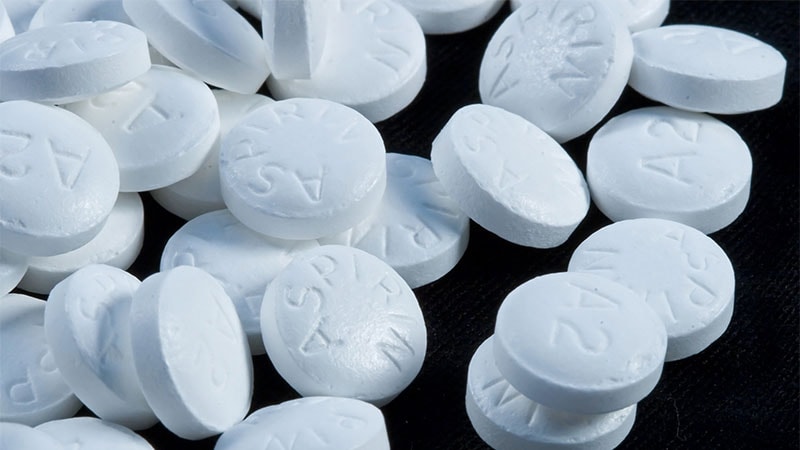AMSTERDAM — Dropping aspirin and using low-dose prasugrel (Effient) alone in the initial month of treatment after percutaneous coronary intervention (PCI) failed to lower bleeding risk compared with dual antiplatelet therapy (DAPT), and there was a signal of possible harm in terms of increased subacute stent thrombosis, in the STOPDAPT-3 trial.
“Therefore, dual antiplatelet therapy with aspirin and a P2Y12 inhibitor should still remain the standard strategy at least for 1 month after PCI,” said the trial’s lead investigator Masahiro Natsuaki, MD, Saga University, Japan.
The STOPDAPT-3 trial was presented at the recent European Society of Cardiology (ESC) Congress 2023 in Amsterdam, the Netherlands.
Designated discussant Marco Valgimigli, MD, Cardiocentro Ticino Foundation, Lugano, Switzerland, explained that the current wisdom before this study was that aspirin withdrawal in the post-acute phase after PCI (after 1 month of DAPT onwards) is associated with lower bleeding risk without affecting ischemic risk, but this STOPDAPT-3 trial is the first to look at the idea of not giving aspirin at all.
“This study is a well-designed, well-conducted trial, and the results are very clear: there is no benefit of dropping aspirin in this early period with respect to major bleeding, and at the same time there was some signal for possible harm,” Valgimigli said.
He pointed out that the possible harm was not related to the co-primary cardiovascular composite endpoint, which did fulfil non-inferiority, although he acknowledged the “generous” non-inferiority margin.
Rather, the possible harm was related to an increase in subacute stent thrombosis, which was three times higher in the non-aspirin group (0.58% vs 0.17%).
“While these absolute event rates are extremely low, they are unquestionably higher in the non-aspirin group,” he added.
In his presentation, Natsuaki explained that very short durations (1-3 months) of DAPT followed by P2Y12 inhibitor monotherapy has been shown to reduce bleeding events without increasing cardiovascular events, compared with longer durations of DAPT after PCI using drug-eluting stents.
However, the incidence of major bleeding events within the 1-month mandatory DAPT period after PCI remains high in clinical practice, particularly in patients with ACS or high bleeding risk.
In single-arm studies, use of prasugrel or ticagrelor (Brilinta) alone following new-generation drug-eluting stent implantation was not associated with any stent thrombosis in selected low-risk patients with or without ACS, and it is thought that removing aspirin from the DAPT regimen might reduce bleeding events early after PCI without compromising the risk of cardiovascular events. However, the efficacy and safety of this strategy has not been proven in randomized trials.
STOPDAPT-3 Trial
STOPDAPT-3 investigated the efficacy and safety of prasugrel monotherapy compared with 1-month DAPT with aspirin and prasugrel in Japanese patients with ACS or high bleeding risk undergoing PCI with cobalt-chromium everolimus-eluting stents.
The study enrolled 6002 patients with ACS or high bleeding risk who were randomly assigned to prasugrel monotherapy (3.75 mg/day; the licensed dose in Japan) or to DAPT with aspirin (81-100 mg/day) and prasugrel after a loading dose of prasugrel 20 mg in both groups.
There were two primary endpoints: 1) major bleeding events (defined as BARC type 3 or 5) at 1 month for superiority; and 2) cardiovascular events (a composite of cardiovascular death, myocardial infarction, definite stent thrombosis, or stroke) at 1 month for non-inferiority.
The major secondary endpoint was a composite of the co-primary bleeding and cardiovascular endpoints (cardiovascular death, myocardial infarction, definite stent thrombosis, stroke, or major bleeding) at 1 month representing net clinical benefit.
Results showed that at 1 month, the no-aspirin strategy was not superior to DAPT for the co-primary bleeding endpoint, with major bleeding events occurring in 4.47% of the prasugrel monotherapy group vs 4.71% of those on DAPT (hazard ratio, 0.95; 95% CI 0.75 – 1.20).
The prasugrel monotherapy strategy was non-inferior to DAPT, although there was a relative 50% margin for the co-primary cardiovascular endpoint. Cardiovascular endpoints occurred in 4.12% of prasugrel monotherapy group vs 3.69% of the DAPT patients (hazard ratio, 1.12; 95% CI, 0.87 – 1.45; P for non-inferiority = .01).
The major secondary net clinical benefit endpoint occurred in 7.14% patients in the prasugrel monotherapy group and 7.38% patients in the DAPT group, with no between-group difference, indicating a similar effect on net clinical benefit for both groups.
However, there was an excess of any coronary revascularization (1.15% vs. 0.57%) and definite or probable stent thrombosis (0.71% vs. 0.44%) in the prasugrel monotherapy group compared with the DAPT group, while definite stent thrombosis was not different between the two groups (0.47% vs. 0.37%).
In a subgroup analysis stratified by ACS and non-ACS, the excess risk for cardiovascular events in the no-aspirin group compared with the DAPT group was seen in patients with ACS, but not in those without ACS.
Future: Focus on Dose and Timing
In his discussion, Valgimigli said the implications of this trial for clinical practice were very clear: “Aspirin remains a cornerstone treatment in the periprocedural and acute phase of PCI in patients without indications for oral anticoagulation.”
However, he added that the study opens several important points for subsequent discussion.
These include the role of type and dose of P2Y12 inhibitor therapy used; specifically, he questioned whether the 3.75 mg dose of prasugrel was enough.
Valgimigli also pointed out that this study did not include a purely high bleeding risk population, and he said there was still potential to investigate peri-procedure vs post-procedure aspirin administration.
The STOPDAPT-3 trial was funded by Abbott Medical Japan. Natsuaki reports honoraria from Abbott Medical Japan, Daiichi Sankyo, and Bayer.
European Society Cardiology Congress 2023. Hot Line 3 session: Presented August 26, 2023.
For more from theheart.org | Medscape Cardiology, join us on X (formerly Twitter) and Facebook
Source: Read Full Article
